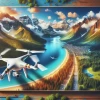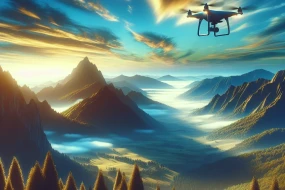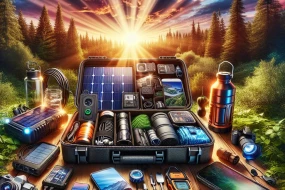
In the ever-evolving world of travel photography, the integration of drones has opened up a realm of possibilities that were once reserved for those with access to helicopters or climbing gear. These flying marvels have democratized aerial photography, allowing enthusiasts and professionals alike to capture breathtaking landscapes from perspectives previously unimaginable. But mastering drone photography involves more than just owning a drone; it requires a blend of technical know-how, creative vision, and a keen understanding of the environment. In this guide, we'll explore advanced techniques that will elevate your travel photography, ensuring your aerial shots are not only stunning but also meaningful.
Understanding Your Equipment: The Drone and Its Capabilities
Before you can soar to new heights with your photography, you must first become intimately familiar with your drone. Every drone model has its unique features, strengths, and limitations. Spend time reading manuals, watching tutorials, and practicing basic maneuvers. This foundational knowledge will pay dividends when you're out in the field. Remember, a drone is much like a camera with wings. Familiarize yourself with its camera settings—ISO, shutter speed, and aperture—just as you would with a DSLR. Understanding how these settings affect your shots in different lighting conditions is crucial for capturing the perfect image.
Planning Your Shot: The Importance of Pre-Flight Preparation
The best drone shots don't happen by accident; they are the result of meticulous planning. Use tools like Google Earth or specialized apps to scout locations virtually before you arrive. Pay attention to the weather forecast, as wind and rain can significantly impact your drone's performance. Consider the time of day—early mornings and late afternoons often provide the most dramatic lighting. Planning your shot also means understanding local regulations. Many countries have strict laws governing where and when you can fly a drone. Research these regulations to avoid fines and ensure a smooth shooting experience.
Composition and Creativity: Framing Your Aerial Shots
Aerial photography offers unique compositional opportunities, but it also presents challenges. Without the usual foreground elements to anchor your composition, you'll need to get creative. Look for natural lines and patterns in the landscape to guide the viewer's eye through the image. Experiment with different angles and heights to find the most compelling perspective. Don't be afraid to break the rules of traditional composition; sometimes the most striking images come from unexpected approaches. Remember, creativity is about pushing boundaries and trying new things.
Mastering Movement: Dynamic Shots with Smooth Transitions
One of the key advantages of drone photography is the ability to introduce movement into your shots. Whether you're capturing a sweeping panorama or following a winding road, smooth transitions are essential for creating professional-quality footage. Practice flying your drone in a straight line at a constant speed, and work on mastering the art of the slow, steady pan. These skills will help you create dynamic shots that draw viewers into the scene. Use your drone's intelligent flight modes to automate complex maneuvers, freeing you to focus on capturing the perfect shot.
Post-Processing: Enhancing Your Aerial Images
Even the best-captured shots can benefit from a bit of post-processing magic. Software such as Adobe Lightroom and Photoshop offers powerful tools for enhancing your images. Adjusting the exposure, contrast, and saturation can bring out the best in your photos, highlighting details that might have been lost in the original capture. Be careful not to over-edit; the goal is to enhance, not to alter reality. Aim for a natural look that stays true to the scene you experienced.
Common Mistakes to Avoid
1) Over-reliance on automatic settings: While drones offer automated modes, relying too heavily on these can limit your creative control.
2) Ignoring weather conditions: Wind and rain can not only ruin your shots but also risk your drone's safety.
3) Disregarding local laws: Flying in restricted areas can lead to hefty fines or confiscation of your equipment.
4) Poor battery management: Always check your battery levels before and during flights to avoid unexpected landings.
5) Neglecting storytelling: Aerial shots should contribute to the narrative of your travel story, not just serve as standalone images.































